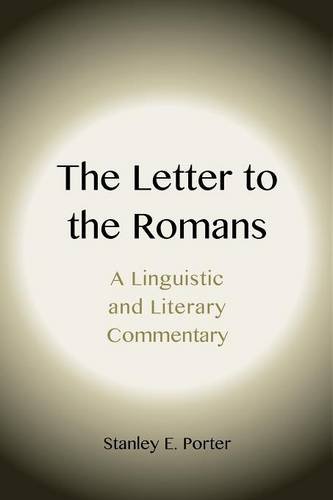 I have worked through enough of Stanley Porter’s The Letter to the Romans to offer a positive recommendation. Porter has complained that most commentaries are composed of comments on other commentaries. This is an observation that I echo as well. He has succeeded, in my opinion, in avoiding that pitfall. As would be expected, Porter is very familiar with the literature on Romans and mentions a large number of secondary articles and books often overlooked by commentators. But he still manages to comment on the text before him.
I have worked through enough of Stanley Porter’s The Letter to the Romans to offer a positive recommendation. Porter has complained that most commentaries are composed of comments on other commentaries. This is an observation that I echo as well. He has succeeded, in my opinion, in avoiding that pitfall. As would be expected, Porter is very familiar with the literature on Romans and mentions a large number of secondary articles and books often overlooked by commentators. But he still manages to comment on the text before him.
Porter has complained that commentaries focus too much on individual words and neglect the macro features of sentence and paragraph. And true to his word, he focuses on paragraphs, another characteristic that echoes with me. He does this because of his sensitivity to the linguistic features of the text, although his emphasis on the Systemic Functional Linguistic school will not be off putting to a reader new to linguistics. His method, clearly explained in the Introduction, is implicit in his comments and does not demand of the reader a mastery of Systemic Functional Linguistics (SFL).
He is fully aware of all the theological issues crowding around Romans, but still keeps his focus on the text. He is also bold enough to offer unpopular views when he thinks the evidence leads there, as seen in his defense and explanation of the ἔχωμεν reading in Rom 5:1. His insight that 5:1-11 serves as the “peak” of the discourse also deserves some serious consideration.
I must end this brief review, but let me encourage you to get this commentary. It is an example of what can and should be done in commenting.
Porter's Romans commentary is an example of what can and should be done in commenting. Click To TweetPreview or buy it here on Amazon.


